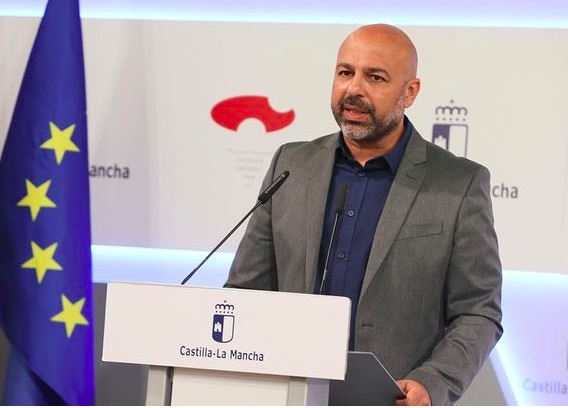.. DEMOCRATIC PARTICIPATION ..
An article from La Cerca: Castilla-La Mancha (translated by CPNN)
The second vice president of the regional government of Castilla-La Mancha, José García Molina, has appeared at a press conference on Wednesday [June 20] to report on the latest steps taken in the preparation of the Strategic Agreement for Peace and Coexistence which was presented to the parliamentary groups last May in the Cortes of Castilla-La Mancha.

José García Molina
Following the line of work of the participative processes in the elaboration of the Law of Participation and the Law of Guarantee of Income and of Citizen Guarantees; the project has been sent to organizations, unions and political formations so that they can participate in its elaboration.
“In a democratic society with a state of law that claims to be so, there is no room for radicalized attitudes, be they political, cultural or religious, that undermine or undermine those values and those principles of democracy,” said José García Molina.
García Molina recalled the months of work developed in meetings with organizations and institutions working in different social and cultural spheres, with refugees, migrants or in a situation of vulnerability, who “have made their views known about what measures could be take to implement policies to prevent all processes of radicalization and stigmatization of these people.”
The draft has been sent to “all the organizations with which we have met, and that implement their daily work in Castilla-La Mancha, eleven representative unions of the region of different sectors, and a total of 53 political formations that have regional and even local and institutional implementation.”
(continued in right column)
(Click here for the article in Spanish)
The culture of peace at a regional level, Does it have advantages compared to a city level?
(continued from left column)
This follows the participatory processes such as those that have been carried out in the elaboration of the Law of Participation and the Law of Guarantees of Income and Citizen Guarantees, “which have favored the broader participatory processes in the History of the Community Board “and” to make civil society a participant in the policies that need to be implemented in our region “, García Molina explained that a basic document has been prepared” that gathers the contributions that generated the highest level of consensus regarding the problems we want to tackle “.
Strategic Plan for Peace and Coexistence
García Molina seeks the unanimous signature, “or at least majority”, on the document for the preparation and implementation of a Strategic Plan for Peace and Coexistence. The plan will follow the guidelines of the European Union, “which already work in other countries “, and that brings together three main axes: social cohesion projects, projects for interreligious coexistence, and projects for the promotion of the culture of Human Rights.
The first axe includes the universality of social policies, the promotion of educational, cultural and social actions for dissemination and awareness of the international problems of refugees; and the creation of a Regional Observatory on Human Rights and Equality Policies.
Second, among the interreligious coexistence projects are the creation of an interreligious dialogue agenda, the convening of an Interreligious Annual Forum; and training modules and / or teaching units that address respect for religious diversity in social and educational centers in our region.
And finally, there are projects to promote a culture of Human Rights including the promotion of diversity and respect for cultural differences, international conferences on multiculturalism and culture of peace, and cultural exchange programs.
“What we hope,” García Molina has concluded, “is that all those social, cultural, political and union organizations will answer us to set a date for the formal signing of that Agreement.” “Our desire,” he added, “is that the support be unanimous because it sends a good message of peace, of coexistence, and above all of rejection of any form of radicalization that can generate violence.”